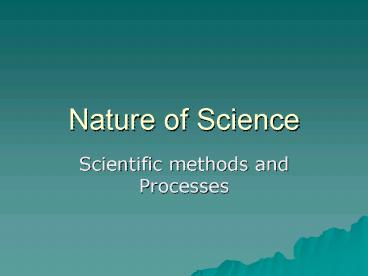Nature of Science - PowerPoint PPT Presentation
1 / 15
Title:
Nature of Science
Description:
Talk show host Jay Leno grills embattled cyclist Landis, who offers new ... (AP) Jay Leno didn't let Floyd Landis off easy, and the embattled Tour de France ... – PowerPoint PPT presentation
Number of Views:64
Avg rating:3.0/5.0
Title: Nature of Science
1
Nature of Science
- Scientific methods and Processes
2
Goals of science
- To investigate and understand nature
- To explain events in nature.
- To use derived explanations to make useful
predictions. - NOT!! To use data to support a particular point
of view!!!
3
Scientific Knowledge is..
- Tentative (Subject to change)
- Based on the most current data and technology
- Because technologies change and advance, our
scientific knowledge can change.
4
Scientific Knowledge is..
- Empirically-based
- Based on and/or derived from the natural world
- Experimentally testable
- Collection of data
5
Scientific Knowledge is..
- Subjective
- Based on the personal opinions of individual
scientists. - Based on their prior knowledge and experiences.
- Different scientists can look at the same data
and see different things.
6
Objective vs. Subjective
- Objective
- Subjective
7
Scientific Knowledge ..
- Necessarily involves human inference, imagination
and creativity - Experimental design
- Creative interpretation of the data
- Observations are related to inferences
- Human constructed relevancy
8
Scientific Knowledge is..
- Socially and culturally embedded
- Based on what we deem important.
- Based on what government finds important.
9
Science can be defined as.
- A body of knowledge
- A process/method and
- A way of constructing knowledge about the natural
world that distinguishes it from other
disciplines or ways of knowing.
10
The starting point..
- Scientists make observations about the world
around them and based on their own prior
knowledge they form a hypothesis. - A valid scientific hypothesis must be testable.
- Therefore, a hypothesis is a testable prediction.
11
Validity!!
- A controlled experiment allows the scientist is
isolate and test ONLY ONE variable. - For example Redi varied the gauze in the
experiment, but everything else was the same! - The experiment must be able to be reproduced.
- They publish their work so that others can try
and reproduce it.
12
Science theories and laws
- A scientific theory is an inferred explanation
for observable phenomena. - It answers the Why?
- A scientific law states, identifies or describes
the relationships among observable phenomena. - It states the What?
13
Common misunderstanding
- A theory does not become a law!
- A well supported hypothesis or hypotheses can
become either a theory or a law
14
Why we have the misunderstandings.
Leno Grills Landis He Offers New Theory Talk
show host Jay Leno grills embattled cyclist
Landis, who offers new theory on drug
test BURBANK, Calif., Aug. 9, 2006By KEN PETERS
AP Sports Writer
(AP) Jay Leno didn't let Floyd Landis off easy,
and the embattled Tour de France champion
responded with yet another theory as to why he
flunked a drug test.Questioned by the "Tonight
Show" host Tuesday, Landis said he may have
unknowingly ingested something that made him test
positive for a high testosterone ratio.
15
Relationship of Scientific Theory and Law
- Scientific Law
- Boyles Law 1670
- Mendels Law of Inheritance 1866
- Newtons Law of Gravity 1666
- Scientific Theory
- Kinetic Molecular Theory 1850
- Chromosome Theory 1915
- None!!































